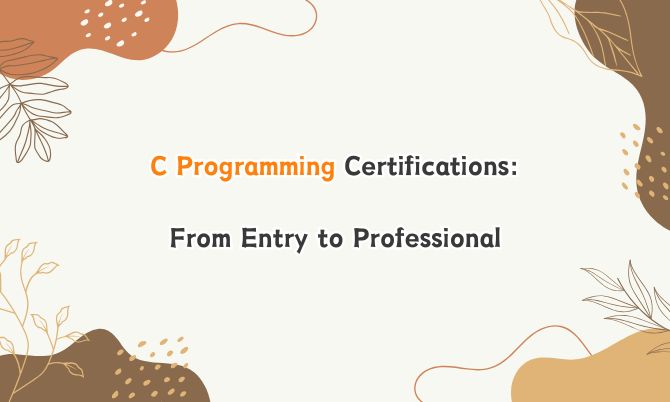C programming is one of the most fundamental and widely-used programming languages in the software development ecosystem, serving as a cornerstone for countless applications and systems. Its versatility and efficiency make it an indispensable tool across multiple domains of computer science and engineering. Whether you're developing low-level hardware drivers, programming embedded systems for IoT devices, creating system-level applications, or building high-performance software, mastering C is an essential step in becoming a proficient and well-rounded programmer. To help guide individuals on their journey toward mastering C and achieving professional recognition, several comprehensive certification programs are available, each thoughtfully designed to cater to different experience levels and career objectives.

Target Audience: Beginners looking to start their programming journey.
The CLE – C Certified Entry-Level Programmer certification is designed for those who are new to the world of C programming and want to showcase their foundational knowledge. This certification serves as an important first step towards a career in software development, low-level and middle-level programming, and other C programming-related fields.
By becoming CLE-certified, candidates demonstrate that they can handle the basics of C programming, including compiling code, using operators, working with loops, managing memory, and writing simple functions.
For entry-level programmers, the CLE certification acts as a stepping stone to more advanced programming roles. It helps aspiring developers stand out in the competitive job market by proving their understanding of key programming concepts. The certification also lays the groundwork for pursuing higher-level C programming certifications, such as the CLA.
Target Audience: Programmers with some experience in C looking to solidify their skills.
The CLA – C Certified Associate Programmer certification is designed for individuals who have a basic understanding of C programming and want to further develop their skills. This certification tests your ability to perform tasks related to the basics of the C language, as well as fundamental programming techniques.
For those looking to advance in the software development field, CLA certification indicates a higher level of competence in C programming, as it proves you can implement more sophisticated coding techniques and handle a wider array of programming tasks.
The CLA certification helps candidates demonstrate that they have moved beyond the beginner stage and are capable of solving more complex programming problems in C. With a CLA certification, candidates are well-positioned to take on more responsibilities, such as developing moderate-sized applications or working in teams on large codebases.
Target Audience: Experienced developers looking to master advanced C programming concepts.
The CLP – C Certified Professional Programmer certification is for seasoned developers who wish to showcase their expertise in the C programming language. This certification covers advanced coding and design tasks, making it ideal for those who want to demonstrate their ability to work on complex C projects.
CLP-certified professionals are expected to have in-depth knowledge of C and be able to tackle large-scale, complex software systems. They should be able to design and implement efficient, scalable, and maintainable systems using advanced C programming techniques.
The CLP certification is aimed at those looking to establish themselves as top-tier C developers. This certification signals to employers that you possess a deep understanding of C and can handle the most challenging programming tasks. CLP-certified professionals are often tasked with leading development teams, architecting systems, or contributing to major software projects that require deep knowledge of C.
Mastering C programming starts with a solid foundation and advances toward more sophisticated, professional knowledge. Here’s a quick overview of which certification might be the right fit for you based on your experience level:
CLE – C Certified Entry-Level Programmer: Ideal for beginners or those just starting with C programming.
CLA – C Certified Associate Programmer: A great next step for those who have learned the basics and wish to gain more advanced knowledge of C.
CLP – C Certified Professional Programmer: Designed for experienced developers who wish to master advanced concepts and solidify their position as C experts.
By pursuing one of these certifications, you can show employers your commitment to advancing your programming skills and your ability to work on a wide range of software development projects. Regardless of the stage you're at in your career, C programming certifications can provide you with the credentials needed to stand out in a competitive field.